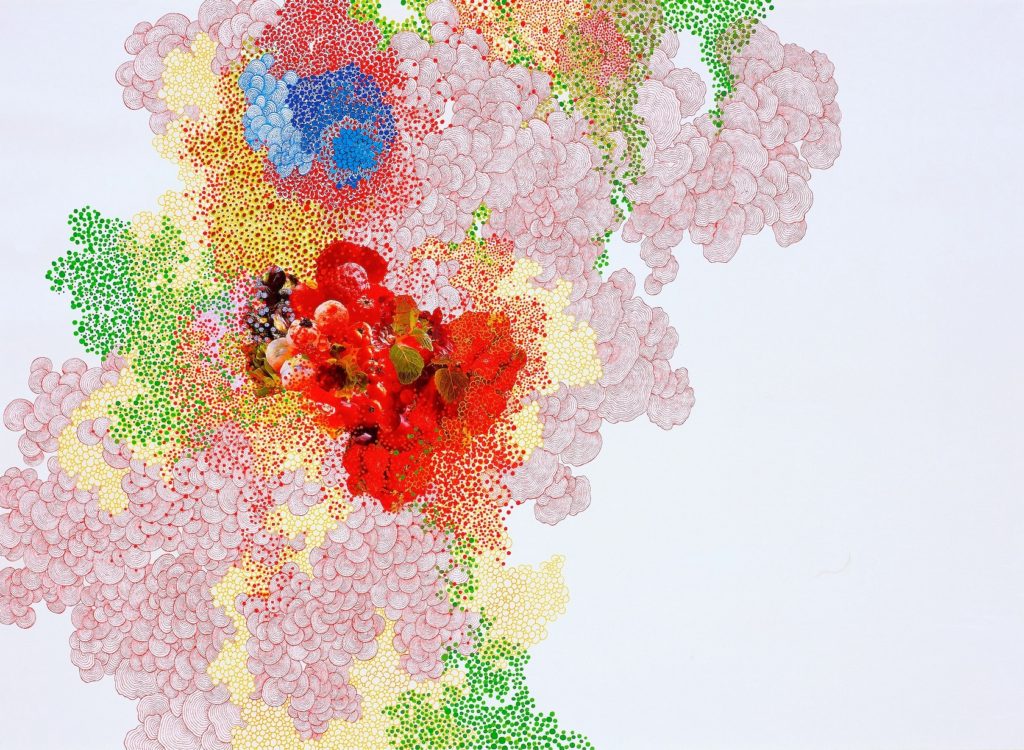
1 July 2021 to 15 February 2022
Commissioned by the Museum for the Displaced
For this first iteration of the Listening Room, MfD is presenting a series of new commissions for its online space. The Listening Room is an online and offline platform that offers a common ground to meet and learn from each other, share views and experiences, and project lines of action.
[Find the Listening Room on the main page menu.]
With contributions by:
Tana Yonas (United States), Stefano Harney (United States) and AWKNDAFFR (Singapore), Dima Mabsout (Lebanon), Tiffany Chung (Vietnam/United States), and Abbas Zahedi (Iran/United Kingdom).
Music, in the form of radio shows, will punctuate the beginning, the middle, and the end. Conversations, videos, soundscapes, and texts on displacement and adjacent realities constitute the other contributions. Threading across the programme are the significance and role of language—the ways in which it can be used to formulate realities and demands, but is also manipulated to distort truth, and kept unchanged to uphold archaic conventions.
In this space of the Listening Room that we occupy for the first time, we wish to plant seeds of solidarity, and also of co-responsibility, truth, and action.
Seats in the Abandoned Theatre is supported by the Goethe-Institut Singapore.
Calendar
Borderless Playlist 1: Walls Come Tumbling Down
by Tana Yonas

This three-part sonic series commissioned by the Museum for the Displaced, uses music as a vehicle to share obstructed stories, and gives an empathic platform meant to take listeners on a journey of recorded sound. It begs to be mentioned that the history of recording is one rife with the politics of privilege like anything else, so there is a foundation of recognition of these artists that found a way to encapsulate these brilliant moments of cultural significance.
The focus for this first installment is on communities who have been bureaucratically erased. The selections of this hour of music comes from the people of Palestine, the Uyghur people in China and surrounding regions, the Hill Tribes of Thailand, Myanmar, Laos, and the Roma people. These cultures are all currently facing violent afronts from globalized and/or local governments and adjacent institutions.
The people of Palestine have been fighting for and working towards sovereignty from the occupying force of Israel and its allies for decades. Looking at all four cultures in this mix of music, their struggle is perhaps the most covered by news in contemporary times. But without a doubt their truth has been largely dismissed by most of the international media. For more information and ways to support this ongoing struggle, please visit Decolonize Palestine:
https://decolonizepalestine.org
The Uyghur people in the Xinjiang region of China have been discriminated due to their religious believes. Re-education centers run by the Chinese Communist Party (CCP) reportedly have about 1.5 million people made up of mostly ethnic Turkic Muslims on native lands. To learn more about the Uyghur people, please visit World Uyghur Congress:
https://www.uyghurcongress.org
The term “Hill tribe” is a blanket designation of the many tribes who live in the thickly forested mountainous regions bordering Myanmar, Laos, and Thailand. The seven major tribes are the Karen, Akha, Hmong, Mien/Yao, Lahu, Lisu, and Palaung; all with their own distinct language with a total population estimated around 7.5 million. They are regarded as inferior by the nations they find themselves bordered in, and many have lost completely or are threatened to lose the right to live on the land that have sustained them for enumerable generations, due to policies that prioritize land grabs by industry. Hundreds of thousands of hill tribe people have been denied citizenship in Burma and Thailand, even though the land they dwell on has been their historic home, denying them the resources they are entitled to. Visit the Integral Tribal Development Foundation to learn more about the people and the efforts to advocate for their collective rights:
https://itdfinternational.org/
The Roma people have traditionally been nomadic like both the Hill Tribes and Uyghur people. Many governing bodies often over prioritize people tied to specific locations when discerning which identities are bureaucratically valued. You might find the term “Roma” alien and unfamiliar, since the derogatory term “Gypsy” is colloquially used, but this ethnic group of more than 10 million people represents the largest minority in Europe. Originally from the northern Indian subcontinent, most of the population currently lives in European countries, but sizable populations are also found in the United States and Brazil. Many Romani only have records from one or two generations, in part because of their traveler ways, but also because of the historic prejudice from the lands they traveled to, that reprehensibly demonized them. Visit the European Roma Rights Centre and get involved in the work to recognize and support the non-governmental advocacy of the Roma people:
http://www.errc.org/what-we-do/advocacy-research
Tracklist:
Wallaat – Love At the Checkpoint (Palestine)
Sabeen – On Man (Palestine)
Le Trio Joubran – Sama-Sounounou (Palestine)
Amal Murkus – Ya Ba la La (Palestine)
Raq Muqam of Ili (Uyghur from Xinjiang Uygur Autonomous Region)
Nebi Ilimli – Bi Vafa (Uyghur)
Makit Dolan Muquam Troupe – Instrumental Music of Dolan Maxirap (Uyghur from Xinjiang Uygur Autonomous Region)
Bİperva – Uyghur Nahxa (Uyghur from Xinjiang Uygur Autonomous Region)
Sanubar Tursun – Yar Ishigide Tursa (Uyghur from Turkish)
Unknown Artist – Karen Folk Song (Karen hill Tribe in Thailand)
Unknown Artist – Karen Folk Song (Karen hill Tribe in Thailand)
Chuck Jonkey – Lao Sieg Tien (Hmong hill tribe Laos)
Esna Redzepova & Usnija Jasarova – Caje Sukarije (Romani from Macedonia)
Kemani Cemal – Yedinci Çocuk Yoldadır (Romani from Turkey)
Kalyi Jag Group – Tuke Bahh (Romani from Hungary)
Taraf – Epic: Radu of Greci (Romani from Romania)
Gypsy Musicians of Constantinople – Romani (Romani from Greece)
Fanfare Ciocarlia – Iag Bari (Romani from Romania)
Conversation: Periodic Table Collective
with Stefano Harney and AWKNDAFFR
Dwellarium: Blackout in Beirut
I invite you to dwell in a series of soundscapes—field recordings of the atmosphere in Beirut today—one year after the explosion that wiped out half the city and all its livelihood. Amidst the capital collapse of a mafia government that never cared for its people, a hungry people who, having taken to the streets, were silenced by a global pandemic and trapped between dense concrete. The scorching heat of a climate crisis cannot be soothed by the little resources everyone is fighting over. Blackouts every day and the rumbling is ever-present. Without it, there would be complete darkness.
Sound is all encompassing, you cannot look away, but you can grow so accustomed to it that it can cease to exist. This rumbling never stops, here in Beirut. It is the sound of diesel combustion, permeating every corner. It is the machine breathing—loud and consistent, so consistent that you forget about it completely. This has become our new neutral, a new kind of silence.
We are dominated by ears that refuse to listen, by systems that isolate us, detach us from the tools and means that keep us alive, keep us in place, in need, inept, hooked, always. We forget that movement is part of life, that silence can be sweeter than this, that another world order is possible. Lift with me, this rumbling from the unconscious, in a journey of play, with the dissonance of the global way of life as we know it.
—Dima Mabsout
Monday, 9 August, 10pm (GMT+8)
Online event:
A conversation with Tiffany Chung and Jana K. Lipman
Artist Tiffany Chung and historian Jana Lipman will discuss their creative and scholarly work on the post-1975 Vietnamese refugee migration and the camps that housed them. Chung’s recent solo exhibition, Vietnam, Past Is Prologue, was presented at the Smithsonian American Art Museum in 2019. Lipman is the author of In Camps: Vietnamese refugees, asylum seekers, and repatriates (2020). Based on their extensive archival and field research in the UNHCR archives, Hong Kong, and Southeast Asia, the dialogue will address refugee activism, the role of host countries, and the contemporary challenges facing refugee advocates today. Chung and Lipman will also discuss how their work aims to shift the established image and narrative of the war in Vietnam and of the refugee exodus in the aftermath.
Register here
Borderless Playlist 2: The Mist Cradles Me Home
by Tana Yonas

The focus for this second installment are the stories of displaced people who were protected by not only the dynamic geology of the natural world, but also by the earth’s flora and fauna. The origin of this story lies in the realization that self-determination and sovereignty is an aching necessity of people facing oppression. This is undoubtedly expressed when reflecting on the liberation movements of the 12 million to 12.8 million Africans forcefully brought to the Americas, and beyond, throughout the 400-year history of the transatlantic slave trade.
Mixtape for the Displaced Meditation: Angst ’01
In a conversation with Abbas Zahedi, Mf D’s Mohammad Golabi described anxiety as “a force that doesn’t let you live your life.” For Zahedi, this elucidation is not only deeply resonant but provides a semantic frame through which to begin to understand the layers within his 11-minute soundscape, Mixtape for the Displaced Meditation: Angst ’01 (2021).
Building upon Zahedi’s exploration of cultural detachment, this Mixtape samples the voice of an online mindfulness coach, amidst the sonics of an Islamic rap-eulogy recited by Zahedi, which he wrote and co-produced in the early 2000s with musical collaborators playatmidnight, Dervish Beats and Ali Saidi. In this way, Zahedi’s Mixtape situates the underlying tension between new-age modes of rapture/escape and the eulogic trance-laden rituals of his ancestors. Echoing each other in different tongues, processes associated with self-mastery and the control of the self—be this to provoke mindful relaxation/optimisation, or faithful subservience—are juxtaposed to create an affective proximity.
Borderless Playlist 3: بالحنين
by Tana Yonas

Homesickness, saudade, ትዝታ, 想家, gurbe, and بالحنين إلى الوطن are just a few ways humans have essentialized the feeling of the desperate longing for the land and community that’s helped shaped them. Economic collapse, a threat of violence, or any other set of unavoidable circumstances can force the decision to flee to foreign lands, in search of not only safety but also a reservoir of hope. Finding that new home is the first of many challenges—alongside it, the five senses are engulfed with a new set of customs, social cues, sounds, and sights. What can be in one way exciting is also inevitably alienating, underscoring culture is intimately linked to the natural and urban environments it’s born out of.
The overwhelming responsibilities that come along with resettling often leaves very little time to emotionally integrate what can be a traumatic experience for many, and this third and last sonic essay for Mf D is a meditation on that state of being; this universal emotion of the somber remembrance of the maternal comforts of home. Place and the depth of connection humanity innately develops to it is profound, and sound not only invokes that but also helps process what for many is primarily an internal dialogue. This collection of songs from Cape Verde, Ethiopia, Italy, Lebanon, Algeria, Turkey, Thailand, Mali, Togo, and Niger are sentimental classics that speak to that heartbreak and the savouring of memories that drip with bittersweet honey.
Tracklist :
Jose Domingus A. Lopes – N’kre Bu Fora Di Marka
Bana – Mar e Morada D’Sodade
Mahmoud Ahmed – Tezeta
Tsegue-Maryam Guebrou – Homesickness, Pt.2
Hailu Mergia – Yefikir Engurguro
Piero Umiliani – Ricordandoti
Fairuz – Le Beirut
Ahmed Malek – Omar Gatlato
Cemil Akbey – Benim Dondum Harmandan Geliyor
Boubacar Traore – Je Chanterai Pour Toi
Akofa Akoussah – Ramer Sans Rame
Camayenne Sofa – Wayakanagi
Mamman Sani – Five Hundred Miles
Biographies
lives and works in Berkeley, California and is a first generation Ethiopian-American who works as a Creative Producer and DJ. She’s constantly dreaming and working on ways to break social divides and deepening her connection to her ancestral history. Her mixes tap into a universal sense of celebration and connection, and speak to how different cultures have thrived in spite of colonisation and other forms of oppression.
is an interdisciplinary scholar and activist, whose research spans social sciences, arts, humanities, and management. He has taught at the Singapore Management University and the European Graduate School, and currently teaches at Royal Holloway, University of London.
Disentangling and deviating from complex contemporary conditions of capitalism and coloniality, AWKNDAFFR is an artistic operation which situates itself at the intersections of art, theory, and praxis. The operative logic of AWKNDAFFR revolves around relationality, agency, and cooperation between peoples and practices, as well as the notion of gathering/s through considerations of space and form. AWKNDAFFR was initiated in 2018 by Wayne Lim and Soh Kay Min.
Wayne (Singapore) is a visual artist exploring notions of aesthetics, economy, and ideology through topics such as logistics, decoloniality, and socio-military complexes. He graduated in 2017 from the Dutch Art Institute in the Netherlands. He uses self-publishing, self-organisation, and long-term collective projects as resistance.
Kay Min (Singapore) is a curator working with theory, fiction, and the linguistic interplays between speculative tenses and historical tensions. They graduated in Anthropology from the University College London, and completed their MA in Contemporary Art Theory at Goldsmiths College, University of London. They worked until recently at the NTU Centre for Contemporary Art Singapore in the Research and Education department.
is globally noted for her interdisciplinary practice, with research-based installations and cartographic works that examine conflict, disaster, progress, spatial transformation, and migration in relations to history and cultural memory. Her work unpacks forced displacement within the complex framework of political, social, economic, and environmental processes in topographies impacted by war destruction and climate disaster. Chung’s work was featured in the main exhibition All the World’s Futures at the 56th Venice Biennale, with 40 map-based drawings from her ongoing Syria Project tracking the current crisis in Syria, which was described as one of the personal but highly political highlights from the 2015 Venice Biennale. Chung has exhibited at museums and biennales worldwide including the Smithsonian American Art Museum, Nobel Peace Center (Norway), Louisiana MoMA (Denmark), Museum of Modern Art (United States), Sharjah Biennale (United Arab Emirates), XIII Bienal de Cuenca (Ecuador), Gwangju Biennale (South Korea), Statens Museum for Kunst (Denmark), among others. Chung is named Mellon Arts & Practitioner Fellow at Yale University’s RITM (TBA in Fall 2021).
is an artist whose creative practice traverses educational, social, and political realms. She is interested in how the arts can bridge between experiences, disciplines, and across social structures. In 2014, she created the Naked Wagon, a mobile platform that creates context for art and exchange on the streets, whose journey contributed to symposia, lectures, and collaborations with artists and organisations in Lebanon, London, and Scotland. She began working with Catalytic Action shortly after, as the art and education programmes director, developing methods in group participation that explore relationships between art and built environments. Today, she is working at a forest school in Lebanon and actively exploring collective art making, theatre, and street performances. She holds a BA in Fine Arts from Central Saint Martins, London, and an MA in Arts in Education from Harvard Graduate School of Education.
is an artist whose interdisciplinary practice blends contemporary philosophy, poetics, and social dynamics with performance, sound, sculpture, and moving-image. With an emphasis on how personal and collective histories interweave, he makes connections whenever possible with people involved in the particular situations upon which he focuses, to invite others into the conversation. He has worked with migrant and marginalised communities in the United Kingdom to explore the concept of neo-diaspora, and the ways in which personal and collective histories interweave.
